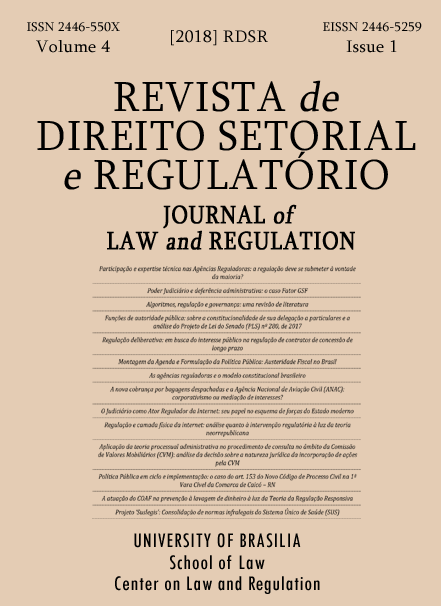Política Pública em ciclo e implementação: o caso do art. 153 do Novo Código de Processo Civil na 1ª Vara Cível da Comarca de Caicó - RN
Palavras-chave:
gestão de processo judiciais, ordem objetiva, implementação, política pública, processo civilResumo
Propósito ”“ Buscou-se descrever a fase de implementação de uma política pública específica que teve como formulador o Poder Legislativo e como implementador o Poder Judiciário, consubstanciada na previsão normativa referente à ordem de tramitação dos processos nas diversas unidades judiciais brasileiras.
Metodologia/abordagem/design ”“ Análise normativa, doutrinária e principiológica sobre a inovação trazida no art. 153 do novo código de processo civil sob a perspectiva da Política Pública em ciclos. Foi conferida atenção à implementação da mencionada Política Pública pela 1ª Vara Cível da Comarca de Caicó/RN, centrando-se nas estratégias e resultados alcançados.
Resultados ”“ A implementação da regra de cumprimento pelas unidades judiciais constitui relevante política pública a ser desenvolvida como forma de buscar efetividade da prestação jurisdicional, desde que executada em observância aos ditames constitucionais, notadamente aos princípios republicano, da impessoalidade e isonomia.
Implicações práticas ”“ Importância da adesão pelo Judiciário à política formulada pelo Legislativo, resguardada, contudo, a independência e gestão próprias. A percepção acerca da relevância da cooperação por todos que participam da implementação.
Originalidade/relevância do texto ”“ Elucidar a aplicabilidade da inovação trazida com a regra de cumprimento pelo judiciário.
Downloads
Referências
ANDRADE, Sara Maria de. Sociologia do Direito - nos termos da Resolução 75 do CNJ. Coleção Direito de Bolso. Rio de Janeiro: Forense; São Paulo: Método, 2011.
BAPTISTA, Tatiana Wargas de Faria; REZENDE, Mônica. A ideia de ciclo na análise de políticas públicas. Disponível em: <http://www.ims.uerj.br/pesquisa/ccaps/?p=432>. Acesso em: 27 Set. 2016.
BRASIL. Lei nº 13.105, de 16 de março de 2015 ”“ Código de Processo Civil. Publicada no Diário Oficial da União em 17 de março de 2015. Disponível em: http://www.planalto.gov.br/ccivil_03/_ato2015-2018/2015/lei/l13105.htm. Acesso em: 10 Dez. 2017.
CARVALHO NETTO, Menelick; SCOTTI, Guilherme. Os direitos fundamentais e a (in) certeza do Direito: a produtividade das tensões principiológicas e a superação do sistema de regras. Belo Horizonte: Fórum, 2012.
DAMATTA, Roberto. Considerações sócio-antropológicas sobre a ética na sociedade brasileira. In Encontros entre meios e fins: a experiência da Comissão de Ética Pública ”“ Brasília : Comissão de Ética Pública. Secretaria Executiva, 2002, p. 52. Disponível em: http://www.cnpq.br/documents/10157/44888/encontro_meios_fins_1.pdf/01f98b10-6557-4f59-83f5-956c4e7b4853. Acesso em: 23 Nov. 2017.
DELFINO, Lúcio. O art. 153 do novo CPC vai contra o advogado diligente. Consultor Jurídico. 1º de agosto de 2014. Disponível em: <http://www.conjur.com.br/2014-ago-01/lucio-delfino-artigo-153-cpc-advogado-diligente>. Acesso em: 29 Nov. 2015.
DIDIER JR, Fredie. Curso de direito processual civil: introdução ao direito processual civil, parte geral e processo de conhecimento. 17ª ed. Salvador: JusPodivm, 2015.
GAJARDONI, Fernando da Fonseca. O novo CPC e o fim da gestão na justiça. Revista Jota. 22/12/2014. Disponível em <http://migre.me/o VEwj>. Acesso em: 29 Out. 2015.
HOWLETT, Michael; RAMESH, M.; PERL, Anthony. Política pública: seus ciclos e subsistemas”“uma abordagem integral. Trad. Francisco G. Heidemann. Rio de Janeiro: Elsevier, 2013.
LIMA, Luciana Leite; D'ASCENZI, Luciano. Implementação de políticas públicas. Revista de Sociologia e Política, v. 21, n. 48, p. 101-102, 2013. Disponível em: <http://www.scielo.br/pdf/rsocp/v21n48/a06v21n48.pdf>. Acesso em: 28 Set. 2016.
MACIEIRA, Maria Elisa Bastos; MARANHÃO, Mauriti; Como Implementar a Gestão em Unidades Judiciárias. Rio de Janeiro: FGV, p. 34, 2010.
MARINONI, Luiz Guilherme; ARENHART, Sérgio Cruz; MITIDIERO, Daniel. Novo Código de Processo Civil Comentado. São Paulo: Revista dos Tribunais, 2015.
MEDINA, José Miguel Garcia. No novo CPC, a ordem cronológica de julgamento não é inflexível. Consultor Jurídico. 09/02/2015. Disponível em <http://www.conjur.com.br/2015-fev-09/processo-cpc-ordem-cronologica-julgamentos-nao-inflexivel>. Acesso em: 29 Out. 2015.
NEVES, Daniel Amorim Assumpção. Novo Código de Processo Civil ”“ Lei 13.105. São Paulo: Método, 2015.
NOBRE, Ticiana Maria Delgado; FARIA, Francisco Ribeiro de; CORDEIRO, Michellson Costa de Lima. Manual de Gestão de Secretaria Judiciária. Natal: Tribunal de Justiça do Rio Grande do Norte, 2013. Disponível em: <http://ww4.tjrn.jus.br:8080/sitetj/pages/intranet/manuaisProcedimentos/manual-gestao-judiciario.pdf>. Acesso em: 29 Out. 2015.
SOUTO, Cláudio. Ciência e ética no direito: uma alternativa de modernidade. Porto Alegre: Sérgio Antônio Fabris Editor, 1992.
THEDORO JÚNIOR, Humberto; NUNES, Dierle; BAHIA, Alexandre Melo Franco: PEDRON, Flávio Quinaud. Novo CPC ”“ Fundamentos e sistematização. 2ª ed. Rio de Janeiro: Forense, 2015.
WEHLING, Arno. O escravo ante a lei civil e a lei penal no Império. WOLKMER, Antonio Carlos. Fundamentos da história do direito. Belo Horizonte: Del Rey, 7ª ed., p. 483-486, 2012.
Downloads
Publicado
Como Citar
Edição
Seção
Licença
Ao submeter seu artigo à Revista de Direito, Estado e Telecomunicações, declaro aceitar a licença de publicação Creative Commons Attribution 4.0 International (CC BY 4.0), disponível em http://creativecommons.org/licenses/by/4.0.


